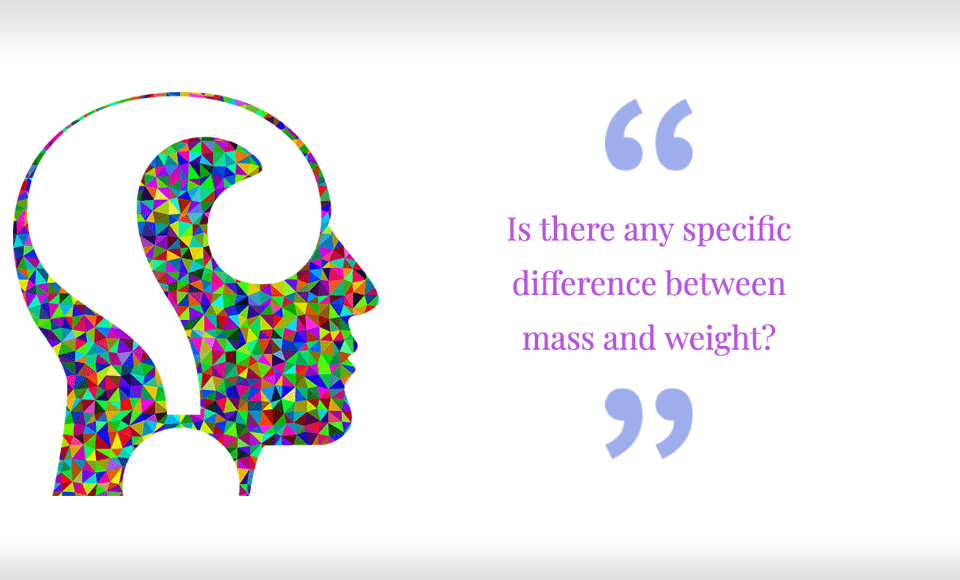Maybe you do not like calculations, neither mathematical formula, nor physics. But it would help if you did them to understand what is the difference between mass and weight. Yes, they mean two different things but often used interchangeably.
If you are on Earth and standing, not moving or doing anything, your mass and weight are the same. However, if you change your location (concerning gravity), your mass will be the same but not your weight.
What is mass?
Technically, mass is the physical body’s resistance to acceleration when a net force is applied. So what does this mean? A physical body is a collection of matter; thus, it can be anything, a ball, a vase, or a dog. The acceleration refers to how quickly something changes its motion, and the net force is the entire force affecting the collection of matter. Therefore, mass in a simpler definition is the amount of collection a matter or stuff needed to stop its motion when something is trying to move it.
How about weight?
Physics define weight as the force exerted on the body by gravity. The Earth, by nature, is constantly pulling near objects towards its center. The more mass the object is made of, the more mass gravity can pull on, therefore, the stronger the force of gravity gets.
So when you are trying to lift a bicycle, it takes a lot of force to do it. The bike, which is a collection of mass, is constantly being pulled to the center of the Earth by gravity, which is considered to be its weight. Therefore your attempt to outdo the Earth’s gravity by lifting the bike away from the Earth is an attempt to lift the bike’s weight.
If it’s still unclear for you, here are more of their differences.
- Mass is a property of matter; therefore, the mass of an object is the same everywhere. Weight depends on the effect of gravity, and it increases or decreases with higher or lower gravity.
- Mass can never be zero, but weight can be zero if no gravity acts upon an object, as in space.
- Mass does not change according to location, but weight varies according to location.
- Mass is a scalar quantity. It has magnitude. On the other hand, weight is a vector quantity that has magnitude and is directed toward the center of the Earth or other gravity.
- The mass may be measured using an ordinary balance, while a spring balance calculates weight.
- Mass usually measured in grams and kilograms, while weight often is measured in newtons, a unit of force.
What’s your weight on other Planets?
Your mass does not change elsewhere in the solar system. But the acceleration and weight vary due to gravitational pull. The calculation of gravity, whether on Earth and other bodies are affected by both the mass and the distance of the object from the center of gravity.
Your weight on Earth is slightly lower when you are on a mountain top than at sea level.
The effect is more dramatic for large bodies, such as Jupiter. While the gravity exerted by Jupiter due to its mass is 316 times greater than that of Earth, you wouldn’t weigh 316 times more because its “surface” (or the cloud level we call the surface) is so far out from the center.
For example, when you go to another planet, you’re always made of the same amount of matter, and your mass never changes. However, planets have different gravity.
You can determine your weight by multiplying with the appropriate number. A 150-pound person would weigh 396 pounds on Jupiter or 2.64 times their weight on Earth.
It would be a surprise that you would weigh less when you are in Uranus, and slightly higher when you are in Saturn or Neptune. You would probably weigh about the same on Venus as it has about the same size and mass as Earth. The Sun is much more massive than any other body, yet you’d “only” weigh about 28 times more. Of course, you’d die on the Sun from the enormous heat and other radiation, but even if it were cold, the intense gravity on a planet that size would be deadly.
Are you now curious about your weight outside the Earth? Maybe, try calculating it with the gravity provided below:
(https://www.thoughtco.com/mass-and-weight-differences-606116)
Body Multiple of Earth Gravity Surface Gravity (m/s2)
Sun 27.90 274.1
Mercury 0.3770 3.703
Venus 0.9032 8.872
Earth 1 (defined) 9.8226
Moon 0.165 1.625
Mars 0.3895 3.728
Jupiter 2.640 25.93
Saturn 1.139 11.19
Uranus 0.917 9.01
Neptune 1.148 11.28
